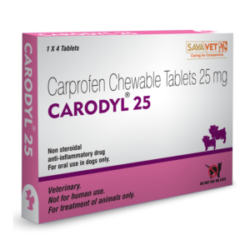Description
Drug Uses
Carodyl is a non–narcotic, non–steroidal anti–inflammatory agent with characteristic analgesic and antipyretic activity approximately equipotent to indomethacin in animal models.
How Taken
Carefully consider the potential benefits and risk of Carodyl and other treatment options before deciding to use Carodyl. Use the lowest effective dose for the shortest duration consistent with individual response. The recommended dosage for oral administration to dogs is 2 mg/lb of body weight daily. The total daily dose may be administered as 2 mg/lb of body weight once daily or divided and administered as 1 mg/lb twice daily.
Warnings/Precautions
For the control of postoperative pain, administer approximately 2 hours before the procedure.
Keep out of reach of children. Not for human use. Consult a physician in cases of accidental ingestion by humans. For use in dogs only. Do not use in cats.
All dogs should undergo a thorough history and physical examination before initiation of NSAID therapy. Appropriate laboratory tests to establish hematological and serum biochemical baseline data prior to, and periodically during, administration of any NSAID should be considered.
Owners should be advised to observe for signs of potential drug toxicity
Carodyl is not recommended for use in dogs with bleeding disorders (e.g., Von Willebrand`s disease), as safety has not been established in dogs with these disorders. The safe use of Carodyl in animals less than 6 weeks of age, pregnant dogs, dogs used for breeding purposes, or in lactating bitches has not been established. Studies to determine the activity of Carodyl when administered concomitantly with other protein–bound or similarly metabolized drugs have not been conducted. Drug compatibility should be monitored closely in patients requiring additional therapy.
Missed Dose
Carodyl is taken as needed, so you are not likely to miss a dose.
Possible Side Effects
Carodyl, like other drugs of its class, is not free from adverse reactions. Owners should be advised of the potential for adverse reactions and be informed of the clinical signs associated with drug intolerance. Adverse reactions may include decreased appetite, vomiting, diarrhea, dark or tarry stools, increased water consumption, increased urination, pale gums due to anemia, yellowing of gums, skin or white of the eye due to jaundice, lethargy, incoordination, seizure, or behavioral changes. The vast majority of patients with drug related adverse reactions have recovered when the signs are recognized, the drug is withdrawn, and veterinary care, if appropriate, is initiated. Owners should be advised of the importance of periodic follow up for all dogs during administration of any NSAID.
Storage
Keep Carodyl out of the reach of children. Store below 30o C. Protect from direct sunlight.
Overdose
Seek emergency medical attention. Symptoms of a Carodyl overdose are not known.
More Information
Carodyl chewable tablets are palatable and willingly consumed by most dogs when offered by the owner. Therefore, they may be fed by hand or placed on food. Care should be taken to ensure that the dog consumes the complete dose.
Disclaimer
This is only general information, it does not cover all directions, drug integrations or precautions. You should not rely on it for any purpose, it does not contain any specific instructions for a particular patient. We disclaim all responsibility for the accuracy and reliability of this information. We`re not responsible for any damage.


Reviews
There are no reviews yet.